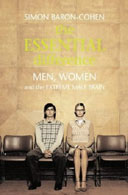
The Essential Difference: Men, Women and the Extreme Male Brain
by Simon Baron-Cohen
288pp, Allen Lane, £16.99
Why do most men use the phone to exchange information rather than have a chat? Why do so many women love talking about their feelings and relationships? We may suspect profound differences between the sexes but do they stand up to scientific scrutiny?
Simon Baron-Cohen argues that men's and women's brains are made differently: the female brain is hard-wired for empathy, and the male to understand and build systems. Take brother and sister Alex and Hannah. Alex's mother remembers that, as a toddler, he loved toy tractors and fire engines and would happily sit for hours prodding and pressing objects just to see what would happen. By the age of five he was obsessed with compiling football stickers. Music came later - naturally he drew up his own pop charts and stored his tapes in strict order - and in his teens he quickly mastered computers. His mother recalls that the interests just "seemed to come from deep within him". Alex, Baron-Cohen says, has a typical systemising, male or "S" type brain.
Hannah's big passion was people. Even in her early years she loved making them laugh and smile. Hannah learned to talk earlier than her brother and plastered her walls with pictures of kittens and foals. As a teenager she also loved pop music, but rather than carefully cataloguing it, she would dance and sing in front of the mirror with her friends. "She's really good at asking people sensitive questions so that she can explore how they're feeling," her mother says. Baron-Cohen says Hannah has an empathic, female or "E" type brain.
Hannah, Alex and their differences sound familiar, and no doubt worryingly stereotypical to some. So will later examples of sex-specific adult behaviour. Yet this is no light-hearted pop at sexual incompatibility. Baron-Cohen is one of this country's most respected psychologists and, as he soberly points out, both men and women evolved on Earth, not Mars or Venus.
The inevitable charge that even discussing such issues encourages sexism is thrown straight back. Baron-Cohen says he would "weep with disappointment" if a reader concluded that all men have lower empathy or that all women have lower systemising skills. These are average men and average women under discussion.
Gender politics dealt with, he turns to proving his idea and he is not short of evidence, much of it drawn from comparisons of male and female behaviour in academic journals. We learn that women consistently score better than men in tests designed to probe empathy while males outscore females on systemising, and that these differences can be seen even in one-day-old babies.
This is, of course, classic nature versus nurture territory, and Baron-Cohen stresses the role that evolution and genes could play in determining men's and women's brain types, while playing down social and cultural influences. It is a compelling, sometimes convincing argument, but ultimately impossible to prove. It is also unclear whether decoding the human genome will really pinpoint genes that control empathising and systemising, as he asserts.
Whether or not you agree with Baron-Cohen's approach, sexual politics, or science, the book's final and probably most controversial argument is a treat for those who simply enjoy a good idea. He suggests that people with autism (and the related condition of Asperger's syndrome) have an extreme version of the male brain: they are poor at empathising, while astoundingly good at analysing and understanding complex systems. As co-director of the Autism Research Centre at Cambridge University, Baron-Cohen is on familiar ground here, and it shows.
In a moving and inspiring narrative, we meet Richard Borcherds, a Cambridge colleague of Baron-Cohen who in 1998 was awarded the Fields medal - the highest maths prize around - yet who is terrified of talking on the telephone. We witness first-hand his diagnosis with Asperger's syndrome, and learn how Borcherds has found an environment in which his condition has not been an obstacle. Others are not so lucky, of course, but it is a paradoxical moment. Baron-Cohen takes 150 pages to build up an argument about what causes the condition, and then renders the cause almost irrelevant next to the effect.
The book has been five years in the writing, partly because he deemed its subject too politically sensitive for the 1990s, and partly because he first wanted to float his ideas about autism at scientific conferences, where he says reaction has been largely supportive. This is his first attempt to present it to a wider audience and it is welcome, to this "S" type brain at least.

